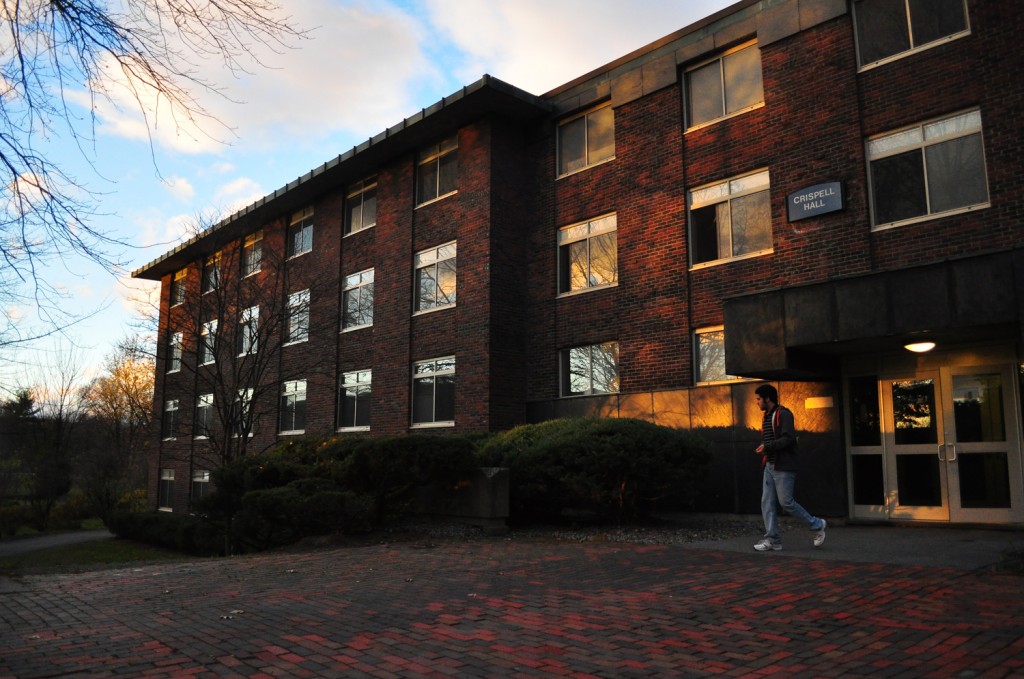

A new living-learning community formed this fall allows American students learning Chinese and native Chinese speakers to live together throughout the semester.
Program Organizer Kristine Harris said the community, which is suite-style and located in Crispell Hall, was established for a variety of reasons.
“We have a growing number of students studying Asian languages —Japanese and Chinese — so we thought of this as a way of reinforcing what students get in the classroom in everyday life and experience,”said Harris, associate professor of history and director of Asian Studies.“In fact, students have been asking for opportunities like this. We already have conversation tables for students studying Chinese or Japanese and that’s a weekly event and sometimes there are movie screenings so this built on that.”
New Paltz was home to a similar living-learning community in the‘70s. Harris said that as the Asian Studies program developed, many alumni returned for reunions and discussed their fond memories of the program.
“It was clear to me that 30 years later people had very clear recollection of their experiences, their friendships and the way in which studying Asian language has had a real impact on their lives,” Harris said.“So much of that coalesced in that community beyond their classroom experience, but connected with it.”
Putting the program together required much more work than anticipated, including getting in touch with the Department of Residence Life more than a year in advance and ensuring that there was a dedicated area for participants to live. They also needed to find a resident mentor to live on site to help guide the program, which proved to be a simple part of the planning as they decided on former professor Jing Jing Xu.
“I thought she would be ideal because she has taught at New Paltz in the past.,” said Harris. “Since we had an opening for a language instructor anyway here on campus, I said to her ‘wouldn’t it be great if in addition to teaching we might be able to provide you with some housing arrangement? Then in exchange she would serve as the resident mentor for this community and since it’s such an innovative program she was very interested in doing that.”
The final part of creating the program was recruiting American students, as well as international students and native Chinese speakers. To garner students studying Chinese, they publicized the program and established an application process, which included a written application and a short interview with Xu. The Center for International Programs, particularly Associate Dean Beth Vargas, was responsible for finding Chinese students to partake in the community.
“Based on what we knew about what was happening with the living learning center, she identified relatively new students from China who we thought would have something to contribute to this experience and would benefit from it as well,” Dean of the Center for International Programs Bruce Sillner said.
The 15 participants were selected in early March, which helped foster a sense of community early allowing the group to become acquainted with each other on Facebook.
Harris hopes that it acts as a cultural exchange and language immersion experience. She feels that the program can serve multiple purposes such as a precursor for studying abroad, a follow up after studying abroad or a chance for students to have an opportunity similar to studying abroad without taking “the full step.” It also gives students coming from China a way to meet American students, something Harris said is often difficult because of the language barrier.
A main goal is to strengthen language skills and cultural knowledge of participants from both ends, something Harris has already seen.
“Students have been telling me it really helps in reinforcing the kind of language learning that you don’t necessarily get in the classroom,” Harris said.
Third-year Asian studies major and community member Justin Beynon agrees that living with a Chinese roommate has improved his language proficiency and cultural acuity.
“It’s cool I can learn about his culture, what actual Chinese people are like, what they value, how they’re different from Americans.” Beynon said. “He’s my roommate so we’re going to know each other so well.”
Sillner aims to the further the residential and academic connection of the program in the future by incorporating activities such as lectures, film series’ and possibly a class for those in the living arrangement. In coming years he would also like to make the same opportunity available to students studying other languages. However, he is pleased with the success of the program has been thus far, only two and a half months in.
“As far as I can tell, this is a really unique opportunity. What makes this program so very special is that we’re pairing native speaking students with students studying the language and with an interest in Asia and China specifically,”Sillner said.“We think that this dynamic gives both sets of students a really wonderful opportunity.”
